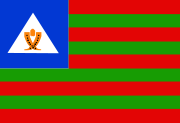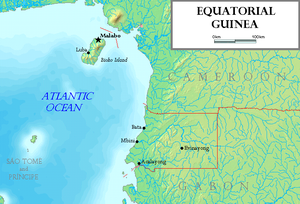
Movement for the Self-Determination of Bioko Island
Encyclopedia


Equatorial Guinea
Equatorial Guinea, officially the Republic of Equatorial Guinea where the capital Malabo is situated.Annobón is the southernmost island of Equatorial Guinea and is situated just south of the equator. Bioko island is the northernmost point of Equatorial Guinea. Between the two islands and to the...
. It has its roots in the pre-independence Unión Bubi, which sought independence from the mainland half of Spanish Guinea. It is supported by the Bubi ethnic group, which dominates Bioko
Bioko
Bioko is an island 32 km off the west coast of Africa, specifically Cameroon, in the Gulf of Guinea. It is the northernmost part of Equatorial Guinea with a population of 124,000 and an area of . It is volcanic with its highest peak the Pico Basile at .-Geography:Bioko has a total area of...
island (home of the national capital).
The Unión Bubi wanted the Spanish government to separate the Bubi-dominated Bioko and the Fang
Beti-Pahuin
The Beti-Pahuin are a group of related peoples who inhabit the rain forest regions of Cameroon, Republic of the Congo, Equatorial Guinea, Gabon, and São Tomé and Príncipe. Though they separate themselves into several individual ethnic groups, they all share a common history and culture. They were...
-dominated Río Muni
Río Muni
Río Muni is the Continental Region of Equatorial Guinea, and comprises the mainland geographical region, covering 26,017 km².-History:Río Muni was ceded by Portugal to Spain in 1778 in the Treaty of El Pardo...
(the mainland half of Equatorial Guinea) because, if the nation were united, the Bubi would be at the mercy of the Fang, who greatly outnumbered them. During the Spanish colonial era, the Bubi received better treatment and more education than the other ethnic groups, and many in the ethnic group feared that the country would be taken over by "illiterates." A vibrant political movement grew around the cause of independence for Bioko.
Under the rule of Francisco Macías Nguema
Francisco Macías Nguema
Francisco Macías Nguema was the first President of Equatorial Guinea, from 1968 until his overthrow in 1979.-Rise to power:...
(1968-1979), almost all Bubi political activists were either killed or exiled, and any aspirations for autonomy were dashed. President Teodoro Obiang Nguema Mbasogo
Teodoro Obiang Nguema Mbasogo
Teodoro Obiang Nguema Mbasogo is an Equatoguinean politician who has been President of Equatorial Guinea since 1979. He ousted his uncle, Francisco Macías Nguema, in an August 1979 military coup and has overseen Equatorial Guinea's emergence as an important oil producer, beginning in the 1990s...
(1979-), a Fang from the same family as Macías, continued the policy of prohibiting separatist movements.
The MAIB has support from traditional Bubi leaders and some of the general population of Bioko, but the party is forced by law to operate secretly. The MAIB gained international attention when one of its main leaders, Weja Chicampo, was tortured and severely injured in March 2004 by government agents.
Some years before, on January 21, 1998, military governmental forces had strongly fought against an attempt of independence from the mainland. Hundreds of Bubi were tortured and abused in Black Beach. People know a little about what happened in the south and center of Bioko Island where hundreds of Bubi disappeared. Those events are related in a book by a witness to the events, the Italian writer Franco Lelli, Okiri: Una Storia Africana (I.P.S.I.A. Terni, 2005).

